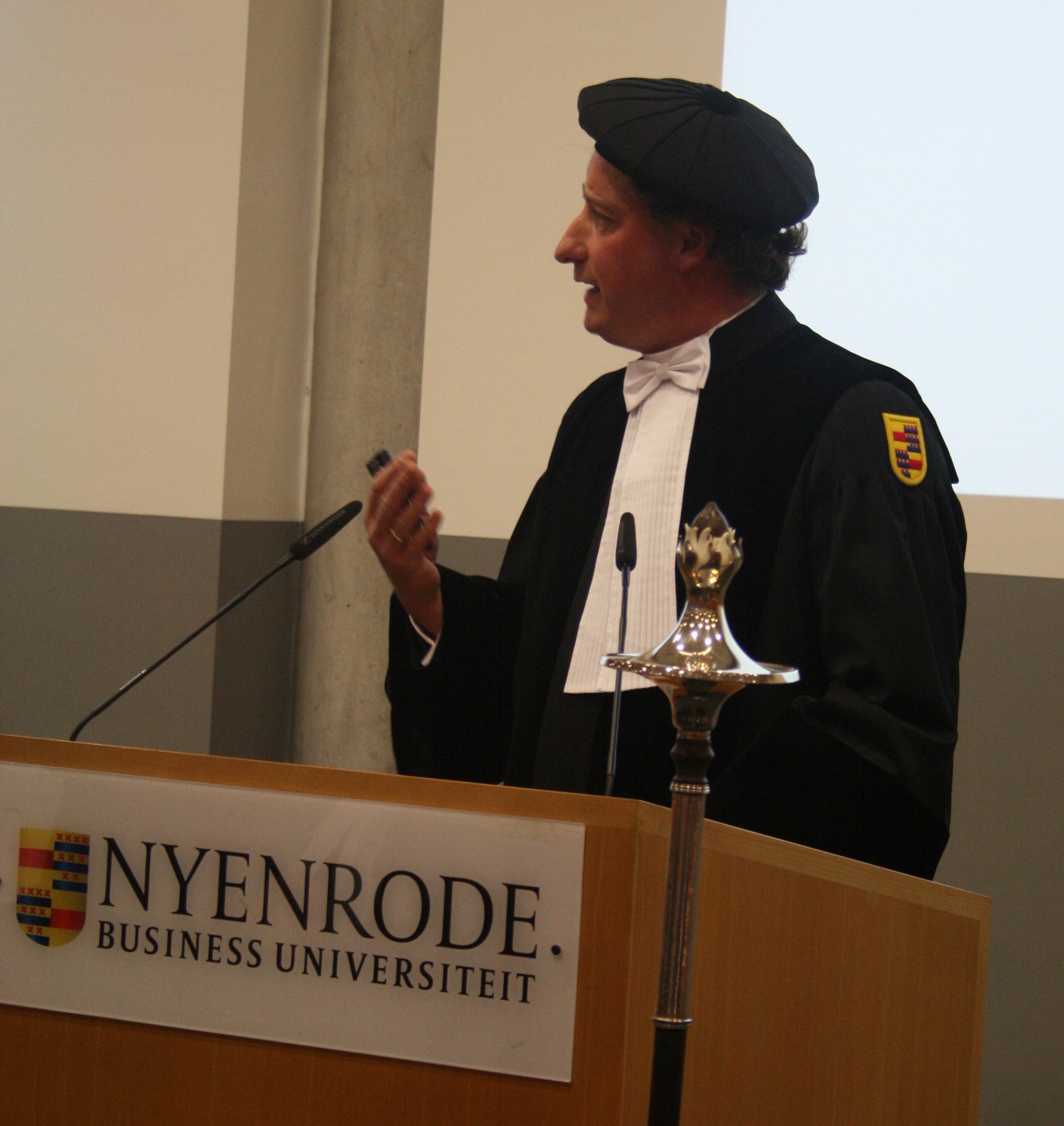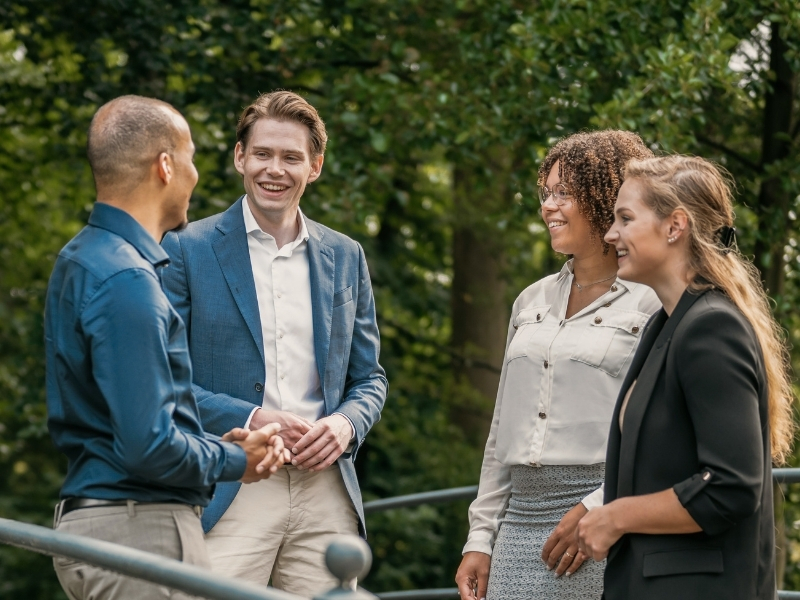“The field of Auditing & Assurance is about people and trust”, says Prof. Dr. Joost van Buuren. However, according to Van Buuren, the field has not been innovative enough in recent years and is failing to adequately fulfill users’ wishes. Van Buuren therefore calls upon the sector to develop a new active approach: one in which innovation is aimed at meeting users’ needs and boosting their trust in the accountant through scientific validation of audit methodology. Van Buuren: “Accountants must start thinking differently and seize opportunities with an open mind in order to increase the relevance of the accounting position.”
These are a few of the topics that Prof. Dr. Joost van Buuren RA discussed in his inaugural speech on Wednesday, November 28, 2018. The speech is titled “The old days of Accountancy are over. On the need for academization of audit methods”. Prof. Dr. Van Buuren delivered this speech to mark his acceptance of the chair in Auditing and Assurance at Nyenrode Business University.
Insufficient innovation
The role of the accountant has repeatedly come under discussion in recent years, despite all the measures taken by the profession. “More fundamental change is needed”, Van Buuren explains. In his view, “the core of the problem is that, over the last several years, accountants have not been innovative enough in performing their legal duty: auditing annual financial statements.” This service has remained relatively unchanged for the past 50 years: accountants have been providing a so-called “true and fair view” statement with a “reasonable level of assurance” since the 1970s. That fact is striking, as the world has changed considerably since then and it is a completely normal occurrence within other sectors to compete for quality in order to meet clients’ demands. Van Buuren: “The good old days when accountants would decide which auditing method was relevant and defensively attempt to uphold the status quo are over. It’s time to raise the bar.”Innovation and academization increase relevance
To achieve innovation, Van Buuren calls upon the sector to adopt a new approach: one that focuses on actively meeting stakeholders’ needs and boosting trust in the effectiveness of the audit. These are two sides of the same proverbial coin in the accounting profession. Van Buuren observes that “efforts to innovate audit methodology have not been sufficiently geared towards the changing needs of users. At the same time, it is striking to note that thus far the new audit methodology has not been scientifically validated for effectiveness before being applied.” Especially now that accountants are fully engaged in updating audit methods using data analysis, it is crucial to first validate these reforms before implementing them on a large scale. The fact that scholarly research is not embedded deeply enough in firms’ business operations and innovation agendas can be seen in areas such as the extremely low number of PhD-holding accountants who work at accounting firms. Van Buuren therefore advises firms to focus on supporting doctoral studies and establishing research and development departments. Only substantial investments will enable adequate research and development to occur within the accountancy sector and accountants to set themselves apart based on quality. “Scholarly research is vitally important for accountants to remain relevant in a knowledge-intensive, dynamic society”, Van Buuren says. “The passion to meet users’ ever-changing needs must be at the heart of such efforts.”Changes to earnings model
Academization will cause accountants’ earnings model to change and become more capital-intensive. As part of these changes, a significant portion of revenues will go towards research and development in order to keep up with the competition. Van Buuren: “Through scholarly research, the profession will become more knowledge-intensive, complex, challenging and also attractive. It will essentially give the profession an upgrade.” Collaboration between firms will be a must if they are to remain competitive, and this is especially the case for smaller firms. Van Buuren: “The use of open-source codes with algorithms for data analyses can offer great opportunities for sharing knowledge about the characteristics and effectiveness of audit methodology.” He also states that “the role of the IAASB as a standard-setter will have to change to a role that places a central focus on continuous innovation of audit methodology, sets corresponding quality criteria and seeks ongoing alignment with interest groups.” The same applies for the Dutch professional association: the Netherlands Institute of Chartered Accountants (NBA).Van Buuren: “The new approach strengthens the market’s trust in the accounting position, and this will in turn stimulate the economy.” In his speech, Van Buuren therefore calls upon the sector to develop a new approach that centers on user needs and the scientific validation of audit methodology. As he puts it, “the profession will have a bright future if it makes the client the number-one priority as the stakeholder in the audit.”
You can read the full transcript here (Dutch) of Prof. Dr. Joost van Buuren’s speech here
Tags
Related programs
-
Master in Management (MSc) | Full-time
Start date: August 2026Language:- English
Location:- Amsterdam
- Breukelen
16-month full-time program designed to develop academic and professional skills. With a strong focus on practical business knowledge, Nyenrode prepares students for global careers while fostering personal growth.
View program
-
PhD Program (part-time)
Start date: 1 september 2026Language:- English
Location:- Breukelen
Obtain your PhD degree at Nyenrode Business Universiteit. Develop your academic, research and personal effectiveness skills. Focus on both academic rigor and practical and societal impact.
View program
-
English (Pre-) Master of Science in Accountancy | Part-time
Start date: May 2026Language:- English
Location:- Other...
Learn modern accountancy practices and elevate your career with Nyenrode.
View program

